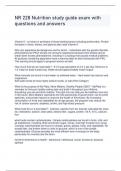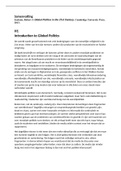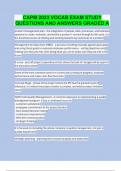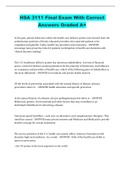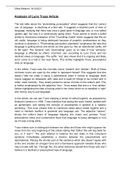NR 228 Nutrition study guide exam with
questions and answers
Vitamin K - co factor in synthesis of blood clotting factors including prothrombin. Protein
formation in bone, kidney, and plasma also need Vitamin K
Why can aspartame be dangerous and for whom - Individuals with the genetic disorder
phenylketonuria (PKU) should not consume aspartame because their bodies cannot
break down excess phenylalanine, resulting in a buildup that causes medical problems.
All products containing aspartame have a warning label to alert individuals with PKU.
This warning should apply to pregnant women as well.
How much fluid do we need daily? - 9-13 cups equivalent to 2-3 L per day. Minimum is
1.5 L/day for body functioning. Intake should approximately match output.
What minerals are found in hard water vs softened water - Hard water has calcium and
magnesium
Soft water tends to have higher sodium levels, or salt (think Colligan)
What is the purpose of My Plate, More Matters, Healthy People 2020? - MyPlate is a
reminder to find your healthy eating style and build it throughout your lifetime.
Everything you eat and drink matters. The right mix can help you be healthier now and
in the future. More Matters represents the first partnership of government, not-for-profit
agencies, and private industry to improve the health of Americans. By increasing
consumption of fruits and vegetables by all age groups, the program may reduce the
risk of certain cancers, diabetes, stroke, and high blood pressure
What must be on a food label? - Calories, calories from fat, total fat, saturated fat, trans
fat, cholesterol, sodium, total carbs, dietary fiber, sugars, protein, Vit A, Vit C, calcium,
Iron
what foods contain carbohydrates - Simple carbohydrates are found in fruits, milk, and
all sweeteners, including white and brown sugar, honey, and high-fructose corn syrup.
Complex carbohydrates are found in cereals, grains, pastas, fruits, and vegetables. All,
except fiber, are broken down to units of glucose, which is one of the simple
carbohydrates. Glucose provides the most efficient form of energy for the body,
particularly for muscles and the brain.
list the 6 dimensions of health - behavioral, intellectual, social, emotional, physical,
spiritual
, EAR - estimated average requirement is the amount of a nutrient needed to meet the
basic requirements of half the individuals in a specific group that represents the needs
of a population.
AMDR - Acceptable macronutrient distribution ranges are daily percentage energy
intake values for the macronutrients fat, carbohydrate, and protein.
AI - Adequate intake is the approximate level of an average nutrient intake determined
by observation of or experimentation with a particular group or population that appears
to maintain good health.
RDI - Dietary Reference Intakes combines the classic concerns of deficiency diseases
that were the original focus of nutrient recommendations with the contemporary interest
of reducing the risk of chronic diet-related diseases such as coronary artery disease,
cancer, and osteoporosis. Current set of nutritional standards
What affects carbohydrate absorption? - The gastrointestinal (GI) tract has the role of
digesting carbohydrates into monosaccharides for easy absorption. Enzymes specific
for disaccharides for sucrose, maltase for maltose) are secreted by the small intestine's
brush-border cells, which then hydrolyze disaccharides into monosaccharides. After an
active absorption process (i.e., one that requires energy input) absorptive cells in the
small intestine take up these monosaccharides
Define "nutrient" and their role in our health - Nutrition is the study of nutrients and the
processes by which they are used by the body. The primary role of nutrients is to
provide the building blocks for efficient functioning and maintenance of the body,
nutrition may appear to belong only within the physical health dimension. However, the
effects of nutrients and their sources on the other health dimensions are far reaching.
Nutrition is the cornerstone of each health dimension.
Role of minerals - serve as structural purposes in the body and are found in body fluids
influencing muscle function and the CNS
role of Vitamins - provide no energy but assist in the release of energy from carbs,
lipids, and proteins
role of Water - functions to breakdown substances and reform them for use by the body.
As part of blood, it provides means of transportation for nutrients to and from cells
role of Carbs - are a major source of fuel. Glucose as a carb provides most efficient
form of energy for body, particularly for muscles and the brain
Fats - are the densest form of energy available in foods and as stored energy in our
bodies. Fats (lipids) also serve as components of cell structure, role in production of
hormones, and providing padding to protect body organs

